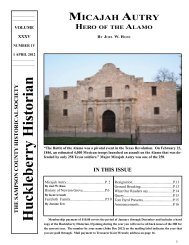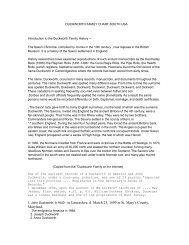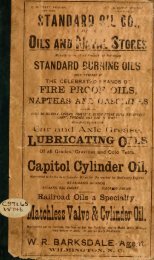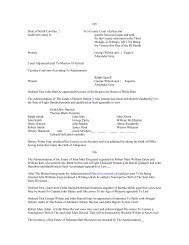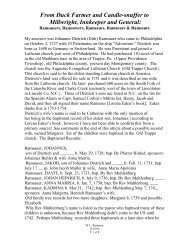11/25/07 VERSION: BEDSOLE HISTORY FROM 1673 ... - NCGenWeb
11/25/07 VERSION: BEDSOLE HISTORY FROM 1673 ... - NCGenWeb
11/25/07 VERSION: BEDSOLE HISTORY FROM 1673 ... - NCGenWeb
Create successful ePaper yourself
Turn your PDF publications into a flip-book with our unique Google optimized e-Paper software.
hundred two feet long, twenty-five feet wide and twenty feet deep and the cracks<br />
between its many wooden planks were sealed with tar and tar-soaked twine. It was a<br />
miracle it could even survive such a hazardous trip without falling apart, considering<br />
the beating it was certain to incur from the constantly heaving, frothing, and<br />
thrashing water of the open ocean for such a long period of time. For this trip, it<br />
carried a passenger load of 106 settlers and a crew of twelve men.<br />
Think of it; <strong>11</strong>8 Men, women and children on a vessel that small for ten to twelve<br />
weeks or longer under such conditions; With almost all passengers being sick and<br />
some even dying during the trip, no toilet facilities except for buckets tied to ropes,<br />
no privacy and no provisions for taking a bath except for buckets of salt water dipped<br />
from the ocean. These were accepted hardships and baths were generally ignored.<br />
These ships were also loaded with trade goods, fresh water which always became<br />
stagnant, food, a few medical supplies, and the few pitiful household goods of the<br />
passengers.<br />
Many times the ships captains would steal the baggage carried by the passengers<br />
and sell it or load it onto a different ship for a price, with the settlers pitiful belongings<br />
never seen again by the owners. Their baggage usually contained dried fruit, butter<br />
which turned into a mess during the summer sailings, other foodstuffs, clothes, tools<br />
and money which they had planned to use to live, eat, pay for their fare and for<br />
supplies upon reaching their destination. They were not aware that their pitifully<br />
small amounts of money would be next to useless in the “New Land”, because<br />
"Trade" was the most prevalent "money" in this country at that time. The fare for the<br />
poorer passengers was guaranteed by the more affluent settlers already in the New<br />
Land, and who were in great need of laborers and who would pay the Captain upon<br />
arrival in what was called "The Bath Settlement" which later became Bath, NC, in<br />
this case.<br />
Aboard ship, the passengers were crammed into very tight quarters. At first, they sat<br />
on the top deck sitting on lashed-down household goods, boxes and bags of cargo,<br />
and personal belongings, as they grew tired, sleepy and hungry, they wandered all<br />
over the ship, both above and below decks . Being powered by sails, such ships<br />
usually found themselves becalmed for several days and nights during these trips.<br />
Because such sitting and waiting for the wind to blow may last for two days at a time.<br />
That was a total nightmare always waiting to happen and too often it did.<br />
Twenty five cannons were also lashed on deck, by the ships crew. They were<br />
needed to fight off any Spanish ships they were liable to encounter on the trip in<br />
view of the fact that Spain and England were at odds at that time. Leaving port, the<br />
ship was heavily loaded, and with its sails full of wind, it slowly headed out into the<br />
open ocean.<br />
The next morning about two a.m., no surprise to the crew of course, they awoke to<br />
find the ship groaning, cracking, popping and creaking as it heaved, tossed, pitched,<br />
rolled and yawed from side to side wildly, with loud crashing sounds, in the opening



